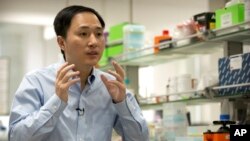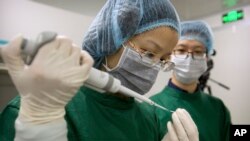China has proposed new rules for gene editing and other “high risk” biomedical technologies. The proposals come three months after a Chinese researcher was widely criticized after claiming he had created the world’s first genetically-edited babies.
A draft of the measures was published this week on the website of China’s National Health Commission. The new rules would cover gene editing, stem cell experiments and biological products created for the human body, the Chinese government-supported Global Times newspaper reported.
Future projects considered high-risk would have to be approved and managed by health department officials from the State Council, China’s national cabinet, the report said. Biomedical research projects considered to have small or medium risk would be managed by local health departments, it added.
The new rules would also require research experiments to pass academic and ethical examinations, the Global Times reported.
Violations of the rules would result in punishment for medical organizations or individuals, the draft proposal said. Punishments could include large fines or a ban on future research. Individuals could also face criminal prosecution.
The back story
These rules come after Chinese researcher He Jiankui reported last November that he had helped make the world’s first genetically edited babies. He said he had edited – meaning changed – the genetic material of two human embryos. The embryos developed into twin girls, who were born.
He Jiankui said he had performed the gene editing to help protect the babies from infection with HIV, the virus responsible for the disease AIDS. He said the process had “worked safely” and the two girls were “as healthy as any other babies.”
His claims were quickly condemned by members of the world scientific community, who denounced them as “irresponsible.” The Chinese government ordered a halt to the work soon after news media reported on the experiment.
This kind of gene editing is banned in the United States and many other countries. Such changes to a person’s DNA can pass to future generations and risks harming other genes.
The researcher’s employer, Southern University of Science and Technology of China, said it did not know about his activities. China’s Ministry of Science and Technology called the experiment “unacceptable.”
He Jiankui spoke to a reporter with The Associated Press the month before his project was made public. At the time, he said he believed gene editing of human embryos resulting in live births was legal in China. The country had no law specifically banning it.
But China’s official Xinhua News Agency reported last month He Jiankui had broken national guidelines and would be punished for any legal violations. Xinhua did not specify which laws were violated, but noted he had created a false ethical examination.
Along with the twins, another embryo yet to be born reportedly resulted from He Jiankui’s experiment. All three are to remain under medical observation with regular visits from government health department officials, Xinhua reported.
I’m Bryan Lynn.
Bryan Lynn wrote this story for VOA Learning English, based on reports from the Associated Press and Global Times. Kelly Jean Kelly was the editor.
Do you think gene editing and stem cell experiments should be subject to government rules? Write to us in the Comments section, and visit our Facebook page.
________________________________________________________________
Words in This Story
draft – n. a plan or proposal that has not yet reached its finished form
manage – v. be in control of a project, company, team, etc.
ethical – adj. relating to what is right or wrong
DNA (deoxyribonucleic acid) – n. a substance that carries genetic information in the cells of plants and animals








